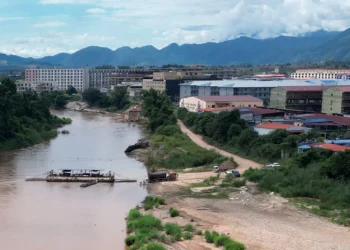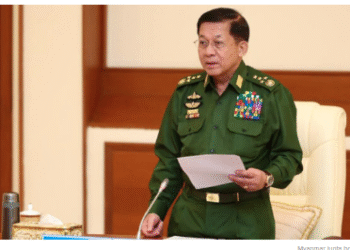The UN Security Council met on Monday to hear reports from the UN’s special envoy for Myanmar on the slow progress of reforms by the country’s ruling military powers.
The Security Council in December adopted a resolution demanding an end to violence and urging the junta to release all political prisoners, including removed leader Aung San Suu Kyi.
But at Monday’s closed-door meeting, special envoy Noeleen Heyzer was expected to discuss how abuses by the country’s military leadership have worsened since the resolution was approved.
Before a meeting, Britain’s UN ambassador Barbara Woodward said the Security Council “really expects to see progress now”.
“The people of Myanmar have been suffering for too long,” Ms Woodward said. “Myanmar is the second deadliest place in the world for civilians and the people of Myanmar really can’t wait.”
Myanmar’s junta has agreed with the Association of South-East Asian Nations to end violence in the country and to certain measures.
Myanmar civilian activist May Sabe Phuy told reporters at the UN that she questioned the UN’s impartiality.
She asked that if the UN and Ms Heyzer were able to “publicly” engage with the “illegitimate junta”, then why do they not also publicly meet with the pro-democracy movement?
Human Rights Watch on Monday called for countries to impose an arms embargo on Myanmar’s military leadership.
Louis Charbonneau, HRW’s director for UN affairs, urged the Security Council to identify concrete steps to counter the grave abuses and violations by the Myanmar military.
These include instituting a global arms embargo, referring the country’s situation to the International Criminal Court, and imposing sanctions on the junta’s leadership and military-owned companies.
“Myanmar’s junta has demonstrated it’s impervious to statements of condemnation or concern,” Mr Charbonneau said.
“Its disregard of the Security Council’s December resolution shows the need for a new resolution imposing strong measures like an arms embargo and targeted sanctions for senior military officials and companies linked to the military.”
Myanmar has been in turmoil since the army toppled Ms Suu Kyi’s elected government in 2021, detaining officials and responding to pro-democracy protests and dissent with lethal force.
Ms Suu Kyi, 77, was sentenced last year to 33 years in prison.
As the situation in Myanmar deteriorates, the UN Security Council has been been split on how to deal with the crisis, with China and Russia arguing against strong action.
Since the coup almost two years ago, 2,600 people have been killed and 19,000 detained.
The junta have used brutal tactics to subdue their enemies and are now using social media platforms to crush democratic opposition, especially women activists, independent UN experts say.
Credit – https://www.thenationalnews.com/world/us-news/2023/03/13/un-security-council-discusses-continued-violence-in-myanmar/






